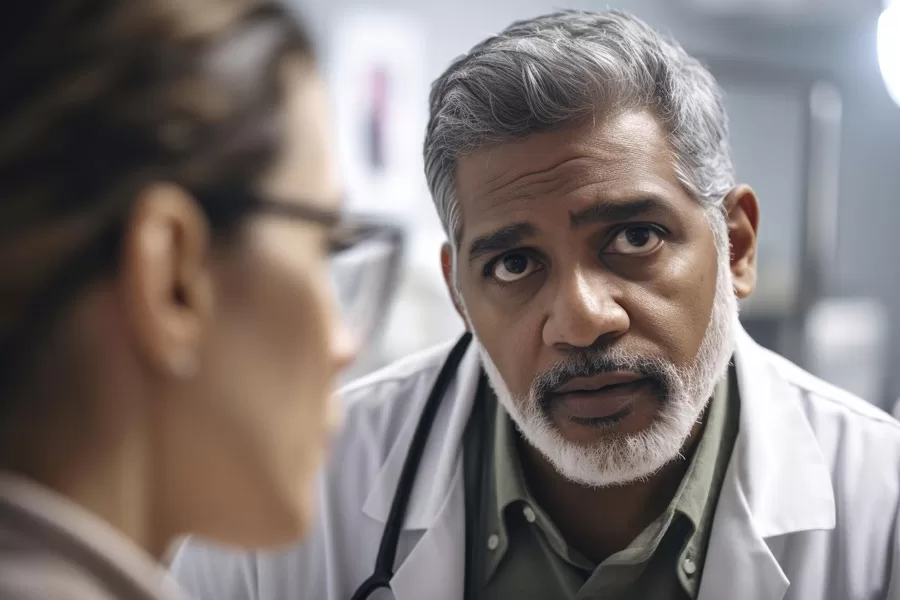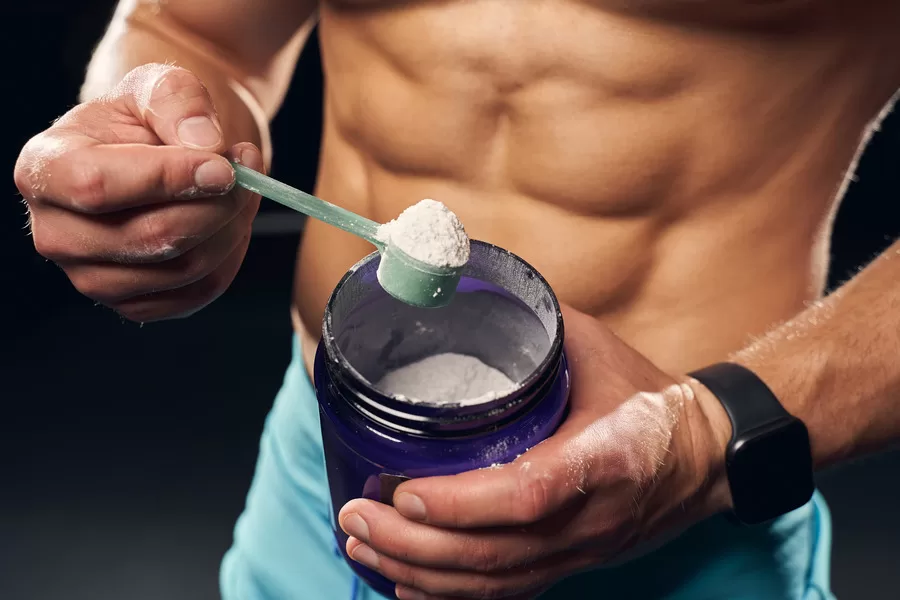
Whether you’re considering testosterone supplements for fitness, health, or anti-aging purposes, stay informed about their implications on one of the most significant men’s health issues. Are you aware of the potential impact testosterone boosters could have on your health, particularly concerning prostate cancer?
Getting to Know Prostate Cancer
Who Should Be Aware?
Prostate cancer often visits men who are over 50, so that’s a group that should be particularly alert. Also, if your family has a history of it, like your dad or brother, you’re more likely to meet this condition. African American men, you guys need to be extra watchful too.
Can You Reduce Your Risk?
Absolutely! Your lifestyle can play a big role. Eating plenty of fruits and vegetables and not too much red meat can be a good strategy. And staying active isn’t just great for your overall health; it can also help keep prostate cancer at bay.
How Do You Spot Prostate Cancer?
This is a tricky one, as prostate cancer can be a bit of a ninja, staying hidden without symptoms at first. But when it starts to show itself, you might notice issues like difficulty peeing, blood in the urine, or pain in the lower part of your body. These could be signs of other conditions too, so best to get them checked out.
Early Detection is Key:
Catching prostate cancer early can make a huge difference. Tests like the PSA are like early alarms. They are especially important for those at higher risk and can detect the cancer before it becomes a bigger problem.
What About Treatment?
If you do get diagnosed with prostate cancer, don’t panic. There are many ways to handle it, depending on how far it has developed. Some men might just need regular monitoring, while others might require treatments like surgery or radiation. It’s about finding the best plan for you and your health.
Keeping up with your health, making smart lifestyle choices, and regular doctor visits are your best defense. And remember, your doctor is always there to help with any questions or concerns you might have!
Prostate Cancer Symptoms
- Changes in Bathroom Habits: A big red flag can be changes in how you pee. Maybe it’s tough to get started, or the flow just isn’t as strong as it used to be. Waking up often at night to pee or feeling like you haven’t completely emptied your bladder are signs too. Paying attention to these changes can be crucial.
- Blood in Urine or Semen: It’s definitely alarming to see blood where it shouldn’t be. If you notice blood in your urine or semen, it’s time to talk to your doctor. It might not mean cancer for sure – but it’s something you can’t afford to ignore.
- Painful Ejaculation: Experiencing pain during ejaculation is not normal and warrants a check-up. It’s one of those symptoms that men might be hesitant to talk about but is important for your doctor to know.
- Persistent Pain in Lower Body: If you’re having ongoing pain or discomfort in the lower part of your body – like your pelvic area, back, or hips – don’t just shrug it off. This could be an indication of prostate problems, especially if it’s a new kind of pain for you.
- Erectile Dysfunction: Struggling with erections can be more than just an embarrassing issue. It can be a symptom of prostate cancer. If you’re having new difficulties in this area, it’s worth bringing up with your healthcare provider.
- Unexpected Weight Loss: Dropping pounds without trying might sound like a welcome surprise, but it can be a sign of advanced prostate cancer. If your appetite is down and the weight is coming off without any effort, it’s time to see a doctor.
- Bone Pain: New pain in the bones, particularly in areas like the spine, hips, or chest, needs immediate attention. This can be a sign that prostate cancer has spread to the bones and needs to be checked out right away.
Remember, while these symptoms can be related to prostate cancer, they can also be caused by other conditions. The best action is to talk to your doctor if you notice any of them. Early detection is key in managing prostate cancer effectively.
Regular health check-ups, especially if you’re over 50 or have a family history of prostate cancer, are vital. Staying informed and keeping in touch with your doctor are important steps in looking after your health.
Testosterone Boosters
The Two Sides of Testosterone Boosters:
Think of testosterone boosters as two options. First, there are synthetic ones – they are usually administered in the form of injections or gels, and they are quite effective. Then there are natural remedies – often made from herbs and plants. They are available over the counter and are a little more gentle on the system.
In the testosterone booster marketplace, you’ve got a wide array of choices. Synthetic boosters are often prescribed by doctors, while natural boosters can be picked up in your local health store or pharmacy. These natural varieties boast ingredients from Mother Nature’s toolkit, believed to help give your body’s testosterone a natural boost.
Their Rise to Stardom:
Initially, testosterone boosters were mainly used in the medical world, helping guys who were running low on testosterone. But soon, they hit the limelight in the fitness and bodybuilding community. Now, they’re the go-to for many looking to up their game in muscle building, energy boosting, and even spicing things up in terms of libido and vitality.
The Big Question – Do They Work?
Well, it’s not a one-size-fits-all answer. Natural boosters have some fans and certain ingredients have been shown to have potential, but everyone’s experience can be different. Synthetic boosters are generally more straightforward in their effects, especially for those with medically low testosterone levels.
Navigating Safety:
As with any supplement or medication, it’s smart to proceed with caution. Synthetic boosters can come with a list of side effects, so they should be used judiciously. Natural options, while typically safer, aren’t completely risk-free either. It’s a wise move to consult with a healthcare professional before starting any new supplement, especially if you’re already on medication.
Testosterone Boosters and Prostate Cancer
When we talk about testosterone boosters, we mean things that people take to increase testosterone in their bodies. This hormone is really important for men’s health. It helps with muscle growth and gives energy. But there’s a big question out there: How do these boosters affect prostate cancer?
A while back, many thought that more testosterone could make prostate cancer grow faster. It seemed logical – if testosterone feeds the cancer, reducing it might slow the cancer down. But now, things look a bit different. Recent thoughts on this are more complex. It’s not just a straightforward case of more testosterone leading to more risk of prostate cancer.
For men without prostate cancer, the question is whether using testosterone boosters might increase their chances of getting this cancer. Right now, it’s something that scientists are still figuring out. We don’t have a clear answer yet.
For men who already have prostate cancer or who have had it in the past, there’s a careful approach to using testosterone boosters. The concern is that these boosters might speed up the cancer’s growth, though this can depend on many factors, like how far the cancer has progressed.
Survivors of prostate cancer also face a tough choice about using testosterone boosters. They need to think about the possible effects and discuss it with their doctor. It’s a personal decision and what’s right for one person might not be right for someone else.
Doctor’s Advice
If you’re considering using testosterone boosters and are concerned about prostate cancer, the most crucial thing is to speak with a healthcare provider. They can assist you in determining what’s optimal for your well-being. Recall that consulting specialists is essential when making decisions about your health.
Prostate cancer and testosterone boosters have a complicated relationship. The best course of action is to remain knowledgeable and consult medical experts, particularly if you have a family history of prostate cancer. You’ll be able to make wise and secure health-related decisions in this way.
Naturally Testosterone Balance with Prostate Cancer
Maintaining a healthy balance of testosterone is especially important for those dealing with prostate cancer. While medical treatment is crucial, there are also natural ways you can help manage your testosterone levels.
Eat Well:
Start with what you eat. A balanced diet helps a lot. Foods like nuts, beans, and whole grains are good for you. They have nutrients that can support healthy testosterone levels. And don’t forget your fruits and veggies – they’re great for overall health.
Stay Active:
Exercise is key. It doesn’t have to be anything too intense – just regular, moderate exercise can make a difference. This could be walking, swimming, or light weight training. Exercise helps keep your hormones, like testosterone, in balance and also keeps you fit.
Reduce Stress:
Keeping stress in check is important. High stress can mess with your hormones. You can try relaxing activities like yoga, meditation, or just spending time doing things you love. Even a short walk or listening to your favorite music can help lower stress.
Get Enough Sleep:
Don’t underestimate the power of a good night’s sleep. Try to get about 7-9 hours of sleep each night. Sleep helps regulate all kinds of hormones in your body, including testosterone.
Watch Your Alcohol Intake:
Drinking too much alcohol isn’t great for hormonal balance. If you drink, try to do so in moderation. And if you smoke, think about quitting. Smoking can also have a negative impact on your hormones and overall health.
Keep a Healthy Weight:
Being overweight can affect your testosterone levels. Eating right and staying active can help you maintain a healthy weight, which is good for your testosterone and your general health.
Talk to Your Doctor:
Remember, these tips should support your medical treatment, not replace it. It’s always a good idea to talk with your healthcare provider before making any big changes, especially if you’re dealing with prostate cancer. They can give you personalized advice based on your health condition. It’s all about taking care of your body and staying as healthy as possible.
Conclusion
Especially imperative for individuals over 50, with genetic links or African American heritage, to be cognizant of prostate cancer risks. Implementing a diet focused on plant-based foods and maintaining physical activity as a defense against prostate cancer. Noticing any alterations in urinary habits, the appearance of blood in bodily fluids, or continuous discomfort in the lower torso. Stresses the importance of routine health evaluations, including the PSA test, for prompt and effective treatment of prostate cancer. Understanding the intricate implications of testosterone boosters on prostate wellbeing, and seeking expert medical guidance prior to use.
FAQs
For African Americans, guys over fifty, and those who have family members who have gone through this.
lower body pain, blood upon ejaculation and urine. Although they might also be signs of another illness, these are some of the primary symptoms of prostate cancer.
Since there is still no precise response to this issue, it is better to seek the counsel of experienced doctors. This supplement should not be taken without a doctor’s prescription.






